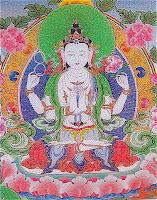Developing Loving-Kindness Workshop Pt. 2

This past Sunday Nov. 23rd. I attended the final day of a two day workshop with Tulku Thondup. It was held at the Shelburne Falls Yoga studio, and sponsored by a Buddhist group in the area. The second day we again went through a long guided meditation with visualization of Avolikestvara Buddha of Compassion (See small image above-handed out by the Rinpoche to help us.)
But the emphasis was to be how to use this practice under different circumstances. Now I did miss the first have hour, but we covered that topic in a general way via question and answer. That was very helpful for me. So I’d like to share some of the Q&A. But please be aware it’s my understanding of what was said and so any inaccuracies are my own. But I hope it is helpful to you too!
Q: If one has difficulty using the image of one’s mother in doing the compassion practice because of issues and pain from that relationship, what should we do?
A: He gave a long and detailed answer. If it is really impossible to generate feelings of loving-kindness to one’s mother then choose a dear teacher or kind person initially. Do not choose a intimate partner as that is too complex and we will most likely generate lust and grasping instead!
If using the image of ones mother is just difficult-work with it, use her. He emphasized that since the point is to develop compassion. Then think first on her own confusion, anger, fears that made her have problems. And also look for the times and the sacrifices that she did make.
He then made a wonderful analogy:
Think about your natural reaction to seeing a car accident, you immediately want to help, perhaps even stopping to offer aid if you are able. You feel compassion naturally, knowing they would not want physical pain or death. So likewise-someone who is angry, difficult and so on is also suffering! In Buddhist teachings they are harming themselves and others. So while we don’t see physical suffering we need to understand that there is still pain-emotional and mental. And feel that same compassion we naturally feel when we see someone physically being harmed.
I found that analogy so so helpful.
Q: Following up to a previous question on how to deal with anger: So are we not supposed to complain or stand up to abusive treatment then, but just work with our own minds?
A: Absolutely you can take action. But, first wait till you are calm not angry, otherwise it is the anger talking and lack of clarity and further problems will result. You will be better at dealing with difficult people and won’t react negatively; eventually they may change. But if they do not you can still act strongly but not from anger. He kept calling it a “poison.” And one does not willing take a poison. So before reacting or talking to the person, first bring in mindfulness of your emotions. See that anger has arisen. Which will hurt you in the future and hurt others. So step back and only when calm take action as needed.
I’ll will add a bit more from the workshop soon. Om shanti.
